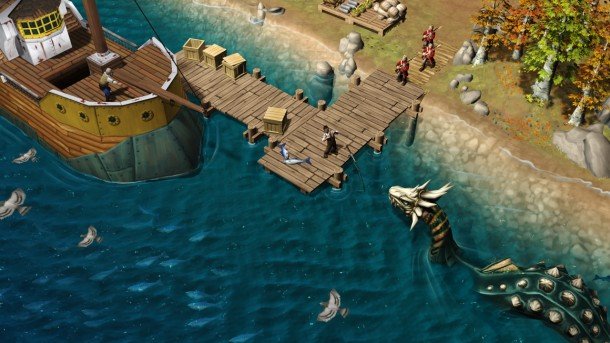Interview: Gaslamp Games' mad, incredible vision for Clockwork Empires

And what types of things could kill your colony?
NV: I have a list of Megaprojects here, including the Radiation Spa, that seems like a good one.
DJ: Everyone could die of radiation poisoning. Everyone could die if you accidentally create some super version of a bull and it, like, stampedes and kills everyone, because it was highly unstable.
NV: Everybody could die at the hands of killing each other, everybody could die at the hands of the resurrection of the Elder Things.
DB: Dig too deep, you explore the lost temple you really shouldn't have...
DJ: Maybe you were working on some kind of technology and the technology workshop explodes, killing everyone inside and maybe everyone in a block radius. So you don't want to build one of those nearby a lot of people or too early on.
NV: Mining accidents, explosion at the Crimble plant, orphans go berserk...
The biggest gaming news, reviews and hardware deals
Keep up to date with the most important stories and the best deals, as picked by the PC Gamer team.
DJ: Not orphans, urchins go berserk.
NV: Right, we're calling them urchins. Yes, yes, yes.
DB: Urchins go berserk.
Morbid! So, on the opposite end of the spectrum, do victory conditions really exist in Clockwork Empires? Or, like Dwarf Fortress, is it just a matter of you're trying to spin that plate as long as possible?
NV: It's plate-spinning. I think we're going to pack in some campaigns...
DJ: There will be a couple of mission modes that actually do have victory conditions. But our interpretation of it is that the sandbox mode, the keep the plate spinning mode, is really where everything is going to happen.
DB: We're considering the missions more suggestions than hard, game-ending things.
And that stems from part of your goal—like Dwarf Fortress—being to create a game where goals and stories feel owned by the player, rather than handed down by the game.
DJ: Yeah.
NV: Very much.
DB: Most RTSes, they give you this scripted campaign. We want to give you that range, but have it be procedurally generated.
NV: There is writing. We are a writing studio, we write. So there is definitely... There's more of a background than, say, Minecraft, where you're a guy named Steve, or Dwarf Fortress, you're a bunch of dwarves named Steve. The Empire is well-established.
DJ: There will be a world, there will be figures within it...
NV: There is a queen, there is a prime minister, there are... What is it, “Her Majesty's Anti-Paranormal Intrusion Invigilators,” or something? You remember what it is, David, it's in the documents.
DB: It's written down somewhere.
DJ: We do have a really heavy Lovecraftian-style influence on the horrible things that can happen, so if you've got a whole bunch of people researching in a building and you just sort of leave them to it and you don't keep tabs on them, there's a high probability that they can start doing evil things and summoning demons or something.
NV: Essentially there is a transitive madness throughout things. One of the problems you run into is that your civilization is going gently mad. Which can be held at bay with laudanum or other opiates...
DB: Or booze.
NV: Or just booze. Laudanum is slightly more effective than booze. The problem, of course, is that you don't actually want everybody turning into cultists. That tends to result in trouble and the summoning of the Elder Things and the invisible geometers and all the rest of that.
DB: Even worse, it looks bad.
NV: It reflects very badly with the prime minister, he wants you to know he's very upset. So at various points, there are tools for getting the madness under control, but if you walk into a mad factory built by a mad architect, you get a little more mad as a result, and that negatively continues to affect your day.
DJ: There's all kinds of this underpinning of Lovecraftian madness, that translating into causing a bunch of problems if you mismanage.
NV: Of actual Lovecraftian madness.
You mentioned to me via email that you want to do what Dredmor did for roguelikes, which is take the core of Dwarf Fortress and make it more accessible. How are you going to make it more accessible?
DJ: Obviously 3D art is a big part of it. I think one of the reasons why Dwarf Fortress isn't for everyone right now... There are a couple of reasons, but I think the two big reasons are the graphics and the user interface. So we're doing things that will allow us to try to get a lot of the functionality through while making it easy enough for people to pick it up. We're trying very hard not to outwardly or ostensibly label it as “Dwarf Fortress For Everybody.” But that's sort of our goal at heart, to try and take that experience and make it accessible. Spending a lot of time on the user interface, making that type of game look like a type of game that people are familiar with and use the same types of tropes in terms of user interface, things that people have already learned, to get them interested in it.
"We're trying very hard not to outwardly or ostensibly label it as 'Dwarf Fortress For Everybody.' But that's sort of our goal at heart, to try and take that experience and make it accessible."
Can you tell me more about the society, the people that make up this civilization? You mentioned urchins, which are different from orphans how, would you say?
DJ: They're more politically correct.
NV: Yeah, pretty much. David, do you want to do this?
DB: Okay. Basically, take your 19th-century British colonies and mix it up in a very strange way. Give it a sort of steampunk feel.
NV: The Victorians were pretty stupid, all in all. Let's face it.
DJ: I would say ignorant, not stupid.
NV: They were very special. They were very special. So if you give the Victorians a whole bunch of slightly unstable steampunk technology and you stick gears in everything and you send them off to colonize the rest of the world which is full of Lovecraftian horrors, that's basically the society you get. You have clerks and incompetent bureaucrats. You have the dangers of art. You have mad scientists. You have naturalists.
DJ: So it's like the Swiss Family Robinson, if instead of being attacked by pirates, they were attacked by crab people.
DB: Or Charles Dickens on crack.
NV: Or obeliskian monoploids.
Fantastic.
DJ: There are also a few characters who we've basically been...sort of stream-of-consciousness fleshing out, including the prime minister, who is attempting to pretend that all of this...
NV: Everything is fine!
DJ: All of the badness that exists doesn't exist. And the queen, who is probably under the influence of some elder horror, but it's not directly referenced until...
NV: She actually attacks. [laughter] Which, I mean, if you picture Queen Victoria with tentacles coming out of every conceivable part of that enormous dress that she wears in all the photos... It's sort of Terry Gilliam. And on top of that you have a number of highly dubious innovations. They're very big on pickling.
DB: They've suddenly discovered that they can put food in cans.
NV: Pickling, pickling is huge. The application of leeches, laudanum, mercury tinctures...
DB: It's a new wave of science, but it's not particularly well-developed or especially safe. We're also, speaking of characters, doing a lot of vague riffs on historical figures and situations from the 19th century. We'll have the equivalent of Queen Victoria, and who's the prime minister, Nicholas?
NV: He's just the prime minister. He's basically D'Israeli , but now he's a very panicked D'Israeli, because he's desperately trying to keep all the plates spinning in the air. “If we could only just start one more colony, if we keep the stiff upper lip and smile, show enough teeth, we'll get more gold money, what, aetheric crystals or phlogiston, maybe, just maybe, we'll last to the end of the month, but we must stick to the Empire, gentlemen, mustn't we? Very good! As you were.”
We also have Lord Palmerstoke. So in the late Victorian era, there was a Lord Kelvin . Lord Kelvin was the great scientific man of his age. Lord Kelvin got absolutely everything wrong in every conceivable way when making predictions about science and history. Man will never fly, the X-ray is a fake. Lord Palmerstoke is the great scientific thinker of his time, whose opinions are widely valued because he's basically wrong about everything.
DJ: But he's very opinionated, and that's how you rise to power.
DB: And well-connected.
NV: We have the Empire Times, the great newspaper. We have the Church of the Holy Cog. “Blessed are the many revolutions of the Holy Cog, for it keeps the clockwork of the indefatigable movement of the celestial heavens in motion.” We have the Cog Pope, who is pretty problematic. So you do have all these people, but we don't plot out having you meet these people. They are largely there, fleshed out, for background filler.
DJ: It's also sort of like Alpha Centauri, where you know that these people exist by the quotes that you get when you research things or something like that.
DB: There's an immense amount of characterization there when you read their little bios. But it's not, you know, a linear story...

How about the characters you do interact with, the ones who make up your colony? What's the average lifespan for one of these characters look like?
NV: Nasty, brutish, and short.
And what are their personalities? What do they do, what are their needs, how do they express themselves within the world?
DJ: It really depends on the character. They're all humans, they have human needs, they need to sleep somewhere, they need to eat food, they need to get drunk if they've had a hard day's work or whatever. But what they like to do and what you suggest that they do are not necessarily compatible. We have the naturalists, who go out and try to find resources for you, like medicine and that kind of thing. Or they just generally try to do botanistic sciences, things like that.
NV: Study strange creatures. You have scientists who do actual science science.
DJ: Soldiers that live out of a barracks, patrol your area, get drunk at the pub. That kind of thing. They spend tax dollars.
DB: You have lower classes who toil in the factories and fields, and then you have a sort of professional middle class, which is generally what the player will give orders to directly. Like overseers and scientists and engineers, clerks, that sort of thing.
DJ: But then there's an upper class who will not take orders from you.
NV: And are basically useless twits.
DJ: And you have to keep them happy, because otherwise they'll complain and lower your prestige.
NV: You have aristocrats and you have capitalist robber barons and you have poets, and you also have urchins.
What's a day in the life of a factory worker look like in Clockwork Empires?
DJ: If they've got a job at the factory, they'll go work the job at the factory, they'll go the pub to drink some cheap booze to make them feel happy, and then they'll go to sleep. And they'll have interactions throughout the day with other factory workers.
I'm curious about those interactions—this is something you mentioned to me over email: about Clockwork creating a system that facilitates characters and the world colliding to produce these kind of small, intimate interactions and quirks in characters. You mentioned a soldier might not want to go to war again. Or a commoner developing a fear of badgers... How are you expressing that stuff?
DJ: I think it really just comes down to... If you are the player and you really want to examine a specific person's life... There will be these kinds of decisions, or these kinds of impacts, on everybody. The breadth and quantity of unique things that can happen to you is somewhat dependent on your station. So the urchins, they'll be able to have an interesting interaction, they'll be able to generate an interesting situation where they'll have a phobia or a distinct liking or something. If you really want to find out about that specific person, there will be some way for you to get that brief bit of knowledge. But if a naturalist goes out, because they play a bigger role than just a typical factory worker, they'll be able to have more of a quantity of these interactions. Which will basically allow them to develop a more interesting AI routine for choosing what they do.
What form are those phobias or likes or dislikes going to take?
DJ: One of the new, more prevalent ways of generating AI in an interesting way is a goal-based AI. And a happiness-based AI. All of our people will have the belief that they want to be happy, and that in order to be happy they have to do certain things. Through interactions with any object... If for whatever reason we decide, based on a number of factors, that that interaction is really important... If the character is highly traumatized by... Maybe they got seriously wounded by something. Or maybe their mate, their husband or wife, just died. Or maybe they just got married or something. Maybe something really good happened to them. Then they have the possibility of reaching out and creating an association with something that is involved in that interaction. A particular place... Maybe the soldier's gun, maybe he develops a really close attachment to it.
NV: ”My lucky gun!”
DJ: Yeah! Or maybe by getting married in a certain place, somebody becomes deathly afraid of that place for the rest of their lives. These things have an ability to just create really strange ways that the AIs can interact, or the citizens can interact, with the environment. They'll do things and you'll think, “Wait, why did he just avoid that building? I thought he really liked that one.”
DB: It could be something as simple as a favorite food.
DJ: Yeah. Or maybe if they see a badger, because a badger wounded them while they were... The naturalist got attacked by a badger. Maybe it causes them to fly into a rage and attack it, just go berserk. Maybe it causes them to run. Maybe they start collecting anything that has the picture of a badger on it.
NV: Yeah, that's the madness. When you're collecting pieces of dead badgers...
DB: The characters should, through interactions with the world, build relationships with game objects or even categories of game objects.
DJ: Yeah. With places or with objects or with other people.
NV: It may be that this is not always an obvious, glaring thing. It is a subtle thing, to be sure. It's part of this experience of trying to build a game that tells stories, and that encourages you to tell stories. God, I sound like Peter Molyneux.
"It's part of this experience of trying to build a game that tells stories, and that encourages you to tell stories."
No, I totally get that distinction. Not everything is represented as some status effect. It's qualitative more than quantitative, and it has some behavior associated with it.
DJ: Yes. A soldier has lost an arm, so he can't use a two-handed weapon.
NV: Attention to detail in video games is something that we're very fond of.
Touching on the upper class' role in Clockwork: is there an incentive for having those guys in your town? Do they arrive independently?
NV: They come on their own.
DJ: They just show up once you've been doing well. They impose interesting restrictions on you that probably aren't very useful to you, and generally get in the way in interesting ways.
DB: They are wealthy and prestigious, so... they'll demand fine brandy and...
NV: Lots of boozes and things.
DB: Seedy novels.
So you have to build facilities or bring in goods that appease them, is that the right way of thinking about it?
DB: Sure, yeah.
NV: Erotic daguerreotypes , you know.

What happens when I click on one of these characters? What information do you expect players to see?
DJ: Essentially it'll give you a description of them. How they're feeling, what they've been up to lately, what they're working on currently. Maybe what they want or need. You won't be able to directly control most of the characters. Most of the interaction is going to be through the buildings. Again, this a user interface decision that we really don't have nailed down until we actually try it, because a lot of this is... A lot of the gameplay has been protoyped, but not actually implemented yet.
DB: It's not like an RTS where you control the units individually. It's more like you put down an order to build a factory here...
NV: Then somebody who can build the factory will build the factory. They'll sort it out amongst themselves who does it.
DB: And about the character information... The paradox is... Like in Crusader Kings 2, they have a great cast of characters with all these qualities, and they use tooltips a lot, more recently... That's a good idea. Crusader Kings 2, it's like this medieval soap opera...
NV: I suppose what you could compare it to is a medieval simulator in the form of a 747 cockpit.
DB: Okay, yeah, a 747 cockpit medieval soap opera simulator. We'd like to be able to pull off something of that sort of... More of a Victorian soap opera, with the character interactions, but... You don't tell them what to do. They are their own people.
NV: All brave and loyal citizens all, except for the mad ones.
DJ: Sort of similar to The Sims, but with more detailed information. Hopefully they don't die of starvation if the fridge gets in the way.
NV: Get stuck in a corner and wet themselves.
DJ: Hopefully not.

Evan's a hardcore FPS enthusiast who joined PC Gamer in 2008. After an era spent publishing reviews, news, and cover features, he now oversees editorial operations for PC Gamer worldwide, including setting policy, training, and editing stories written by the wider team. His most-played FPSes are CS:GO, Team Fortress 2, Team Fortress Classic, Rainbow Six Siege, and Arma 2. His first multiplayer FPS was Quake 2, played on serial LAN in his uncle's basement, the ideal conditions for instilling a lifelong fondness for fragging. Evan also leads production of the PC Gaming Show, the annual E3 showcase event dedicated to PC gaming.

